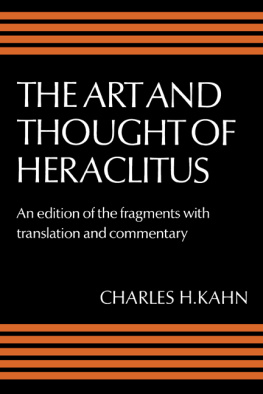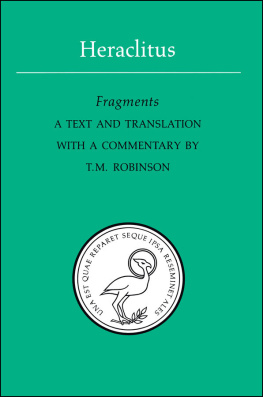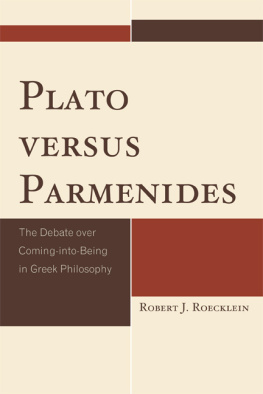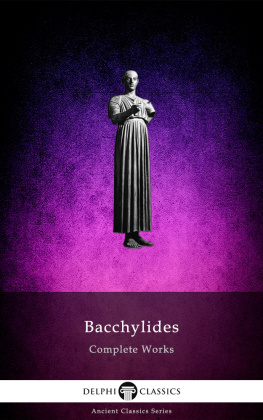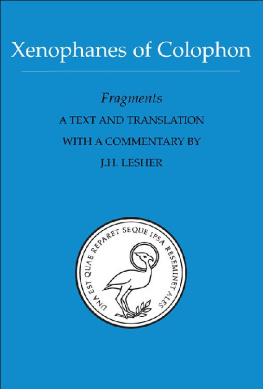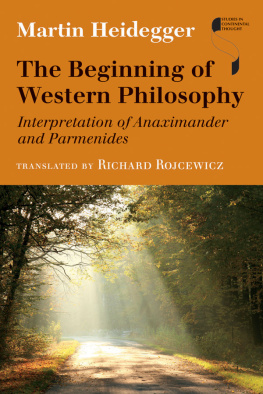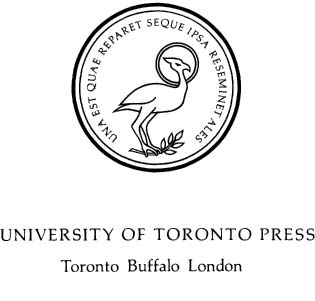Parmenides of Elea
FRAGMENTS:
A TEXT AND TRANSLATION WITH AN INTRODUCTION
by David Gallop
David Gallop provides a Greek text and a new facing-page translation of the extant fragments of Parmenides philosophical poem. He also includes the first complete translation into English of the contexts in which the fragments have been transmitted to us, and of the ancient testimonia regarding Parmenides life and thought. All of the fragments have been translated in full and are arranged in the order that has become canonical since the publication of the fifth edition of Diels-Kranzs Die Fragmente der Vorsokratiker. Alternative renderings are provided for passages whose meaning is disputed or where major questions of interpretation hinge upon the text or translation adopted.
In an extended introductory essay, Gallop offers guidance on the background of the poem, and a continuous exposition of it, together with a critical discussion of its basic argument. The volume also includes an extensive bibliography, a glossary of key terms in the poem, and a section on sources and authorities.
DAVID GALLOP is Professor of Philosophy (Emeritus) at Trent University.
PHOENIX
Journal of the Classical Association of Canada
Revue de la Socit canadienne des tudes classiques
Supplementary Volume XVIII
Tome supplmentaire XVIII
Phoenix Pre-Socratics volume I
Les Pr-Socratiques Phoenix tome I
General Editors / Rdacteurs en chef
David Gallop Trent University
T.M. Robinson University of Toronto
Parmenides of Elea
FRAGMENTS
A TEXT AND TRANSLATION
WITH AN INTRODUCTION BY
DAVID GALLOP
University of Toronto Press 1984
Toronto Buffalo London
Printed in the U.S.A.
Paperback edition 1991
Reprinted 2000, 2009, 2011, 2013
ISBN 0-8020-6908-8
Canadian Cataloguing in Publication Data
Parmenides.
Parmenides of Elea: fragments
(Phoenix. Supplementary volume; 18-Phoenix. Tome
supplmentaire, ISSN 00791784; 18)
Greek text with English translation and notes.
Bibliography: p 131
Includes index.
ISBN 0-8020-6908-8
1. Philosophy, Ancient. I. Gallop, David. II. Title. III. Series: Phoenix (Toronto, Ont.). Supplementary volume; 18.
B235.P22E6 1984 182.3 C83-098921-8
This book has been published with the help of grants from the Canadian Federation for the Humanities, using funds provided by the Social Sciences and Humanities Research Council of Canada, and from the Publications Fund of the University of Toronto Press.
ACKNOWLEDGMENTS
Certain authors in the testimonia on Parmenides are well represented in the Loeb Classical Library. Excerpts from the Loeb versions have sometimes been used, altered or adapted to the style of the present edition where necessary.
More people have helped with this project in one way or another than I can thank individually. I am especially grateful to T.M. Robinson, my co-editor in this series, for valuable advice and criticism. I have been fortunate, from an early stage, in the encouragement and collaboration of Prudence Tracy of the University of Toronto Press. I should particularly like to thank the official readers of the Press and of the Canadian Federation for the Humanities for their careful appraisals and perceptive comments, which have resulted in many improvements. I must also record my gratitude to Gillian Sparrow and Mavis Prior for their painstaking work in typing and preparing a complex manuscript. My greatest debt, however, is to Brad Inwood for his services as my research assistant during 19801. He has given unfailing help in every aspect of the project, correcting and improving my text and translation, researching a wide variety of editorial and linguistic problems, developing a uniform and up-dated system of references, and preparing the Bibliography. He has also researched and contributed the entire section on Sources and Authorities. Without his invaluable assistance this work could hardly have been brought to satisfactory completion.
My thanks are due to Trent University for granting me sabbatical leave during 19789, and to the Social Sciences and Humanities Research Council for awarding me a leave fellowship in that year. I benefited from associations with Guelph University as Alma Mater Visiting Professor in the fall term of 1978, and with the University of Otago in the early months of 1979. I also learned from seminars given at the Universities of Auckland, Canterbury, and Victoria, NZ, at that time. It is a pleasure to thank the philosophers and classicists of all those universities for much kindness during my visits. Finally, let me thank friends and colleagues at Trent for their interest in the project, and for bearing with me patiently during its long gestation.
DAVID GALLOP
Trent University,
Peterborough, Ontario
PREFACE
This volume contains a text and a new translation of the extant fragments of Parmenides philosophical poem. It also offers the first complete translation into English of the contexts in which the fragments have come down to us, and of the ancient testimonia concerning Parmenides life and thought. All of these secondary materials are collected in the comprehensive work of Diels-Kranz, Die Fragmente der Vorsokratiker (6th edition, Berlin 1951), hereafter referred to as D-K, and all have been included here.
The purpose of the translation is to provide an English version that will be of service to modern readers who wish to explore the poem in detail. All the fragments have been translated in full, and appear in the order that has become canonical since the fifth edition of Diels-Kranz. References to the fragments are given in the conventional style derived from this order. Thus, 8.50 refers to line 50 of fragment 8.
As far as differences of word-order allow, the translation of the poem has been arranged in lines corresponding to those of the Greek text. This style has been adopted purely for ease of reference, and not with the aim of producing a poetic version. No attempt has been made to capture the literary qualities of Parmenides verse or the archaism of his language.
Richard Robinson, in the introduction to his translation of Aristotles Politics III-IV (Oxford 1962, p xxx), has characterized a translation as a shameful form of book. For by offering a translation of each sentence in his original, the translator implies that he knows that this is what the original sentence means. But sometimes he does not know what it means, and is only guessing as well as he can. In publishing a fresh version of Parmenides poem the present translator makes no claim to know what every sentence in the original means. To signal the worst uncertainties, alternative renderings have been appended for passages whose meaning is disputed, or where major questions of interpretation hinge upon the text or translation adopted. In these places the reader will find it instructive to compare alternatives. He will then quickly discover how completely he puts himself at the translators mercy, if he relies entirely upon any single version. He may also find it useful, especially if he is wholly dependent upon translation, to consult the short glossary of terms that present special problems of translation or interpretation.
The introduction advocates one plausible, modern interpretation of Parmenides. It also tries to bring out the more important points still in dispute, and some major philosophical questions raised by the poem. It has seemed better to write an extended essay, cross-referenced to the translation, than to provide a separate series of exegetic and critical notes. This arrangement, regrettably, has made it necessary to skate all too lightly over much significant detail. But it also avoids dispersing editorial comment too widely for convenient use; and by allowing a more continuous exposition of the poem than is possible in separate notes, it may better help the explorer to find his bearings in the Eleatic jungle.
Next page

